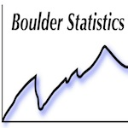- Subscribe to RSS Feed
- Mark Topic as New
- Mark Topic as Read
- Float this Topic for Current User
- Bookmark
- Subscribe
- Mute
- Printer Friendly Page
Discussions
Solve problems, and share tips and tricks with other JMP users.- JMP User Community
- :
- Discussions
- :
- How to tell if prototypes are different from each other
- Mark as New
- Bookmark
- Subscribe
- Mute
- Subscribe to RSS Feed
- Get Direct Link
- Report Inappropriate Content
How to tell if prototypes are different from each other
I have a bunch of prototypes that are described by 8 parameters of continuous numeric data (so I have a data table of 9 columns - column 1 is the prototype name and the next 8 are the parameters). I would like to know how variable my prototypes are from each other. Is there a way to do this?
- Mark as New
- Bookmark
- Subscribe
- Mute
- Subscribe to RSS Feed
- Get Direct Link
- Report Inappropriate Content
Re: How to tell if prototypes are different from each other
When you say parameters, the statistician in me tends to take this quite literally as constants of some characteristic of a population. Mean, variance, etc. Or do you mean parameters more loosely such as measured characteristics of the subject of interest...like measuring heights, weights, ages, of folks in a group of people. I think we need a bit more detail of your specific use case and what you are trying to decide as a definition for 'difference' before we can suggest specific analytic tools that might help?
- Mark as New
- Bookmark
- Subscribe
- Mute
- Subscribe to RSS Feed
- Get Direct Link
- Report Inappropriate Content
Re: How to tell if prototypes are different from each other
By "parameters" I mean measured values like height, width, surface area, etc. I am not sure how to define "difference" in my case...I'm sorry, I'm not a statistician but are there any methods for measuring difference between objects? I'm trying to build a model for an in-use property of these prototypes (in this case, I'm trying to measure flow time as a function of nozzle characteristics). Ideally I would make a DOE and prototype nozzles with measurements defined by the DOE. Unfortunately, I have neither the time nor means to do that at this point but I was able to acquire 8 different nozzles that are currently used on our products. I'd like to know if there is some way of understanding the similarity between the nozzles based on their measured characteristics. I don't want to do the experiment and find out nozzles A, B, and C are nearly all the same and nozzle D is vastly different from the rest. Does that make more sense?
- Mark as New
- Bookmark
- Subscribe
- Mute
- Subscribe to RSS Feed
- Get Direct Link
- Report Inappropriate Content
Re: How to tell if prototypes are different from each other
I would start by comparing the 8 different nozzles (nominal data type) vs. the measurements using Fit Y-by-X and using either ANOM to compare the mean measurement from each nozzle to your overall mean or Tukey-Kramer to compare each pair of means (that is comparing each pair of nozzles looking for differences). I think that ANOM makes the most sense given the information you have provided. Thus, you can begin to understand if there are any differences between the nozzles. If there are some nozzles that differ then you could explore further as to what the differences are between the nozzles (size, diameter, whatever it is that makes them different) to see if you can discover which differences in the nozzles impact the differences in your measurements.
- Mark as New
- Bookmark
- Subscribe
- Mute
- Subscribe to RSS Feed
- Get Direct Link
- Report Inappropriate Content
Re: How to tell if prototypes are different from each other
Lauren: Thanks for the additional information. It sounds like what you are trying to accomplish practically is to determine key factors (you call them parameters) that influence a critical to quality process output characteristic (flow time). So if I were you I wouldn't focus so much on which prototypes are different...but which factors drive optimal performance in the critical to quality characteristic. Then try to figure out levels for the factors which optimize flow time, or in a perfect world, give you insight into key factors and levels that will be incorporated into a more formal DOE oriented approach to solving the practical problem at hand. This is the essence of using historical or happenstance data (this sounds like the type you have) to characterize process performance using empirically generated data TO INFORM DOE.
But it sounds like you don't have the luxury of going down the DOE path...if that's the case...
From the sounds of it your knowledge of modeling techniques based on using empirically derived data is fairly immature? A few thoughts for you at this stage;
1. Can you find someone to mentor you that has a background in empirical modeling with JMP or JMP Pro? They can provide you with specific guidance that you will hopefully find valuable.
2. Take a look at some of the JMP On Demand Webcasts available at :
On-Demand Webcasts | Mastering JMP
You may find the empirical modeling and exploratory data analysis focused presentations informative for the type of problem you are confronted with.
Recommended Articles
- © 2026 JMP Statistical Discovery LLC. All Rights Reserved.
- Terms of Use
- Privacy Statement
- Contact Us


